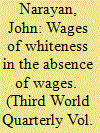| Srl | Item |
| 1 |
ID:
180752


|
|
|
|
|
| Summary/Abstract |
HAVING barely recovered from the shock caused by the election of a nondemocratic candidate as the 45th US president, the Russian academic and expert community, where only avowed "optimists" had bet on a Trump victory, began searching for reasons and explanations for what had just happened. During Donald Trump's term in the White House, a record number of scholarly and quasi-scholarly works were published in Russian. However, most of them were narrowly focused on specific aspects of US affairs, and American domestic and foreign policy, or were separate chapters on the US in studies that lacked regional focus.
|
|
|
|
|
|
|
|
|
|
|
|
|
|
|
|
| 2 |
ID:
150970


|
|
|
|
|
| Summary/Abstract |
The rise, resilience, and unexpected triumph of Donald Trump's 2016 campaign for President of the United States were not the result of an anomalous perfect storm, as some have claimed. A recent op-ed by Arthur Brooks of the American Enterprise Institute, for example, cites a study of financial crises over the past 140 years. It found that uncertainty spikes after financial crises, and that uncertainty often leads to political polarization.
|
|
|
|
|
|
|
|
|
|
|
|
|
|
|
|
| 3 |
ID:
165859


|
|
|
|
|
| Summary/Abstract |
Guided by the thesis that fascism was the outcome of a dialectic of instrumental reason, I argue that Trumpism is the result of a dialectic of neoliberal reason. The 2008 crisis revealed that widely distributed consumption could no longer be sustained through escalating debt, as it had been since neoliberalizing reforms in the 1970s. Economic crisis has been interpreted through a culture market in which pseudo-individual consumers choose what hyperreal public they prefer and participate in pseudo-activity through social media. Retreat into insular hyperrealities and hostility to dissonant alternatives reinforce each other in an escalating logic generating partisan incivility and fake news. The de-democratization of the state through subservience to private interests and political dysfunction has combined with the consumer’s uncompromising mentality as a dissatisfied customer to channel politicization into populism. It aggregates negatively through shared dissatisfaction, driving escalating antagonism between technocratic responsibility and populist responsiveness. These escalating economic, cultural, and political contradictions heighten negative “freedom from” restraints while subverting positive “freedom to” relate meaningfully to the world. This intensifies anxieties and receptivity to authoritarianism as a self-defeating escape from neoliberal freedom. Trumpism exploits precarity, corrupts democratic norms, and licenses misdirected aggression. This neoliberal authoritarianism is inverted fascism. Trump’s presidency is more effect than cause.
|
|
|
|
|
|
|
|
|
|
|
|
|
|
|
|
| 4 |
ID:
166109


|
|
|
|
|
| Summary/Abstract |
Dmitry Shlapentokh discusses the constructed reality that he perceives underpinning the American economy.
|
|
|
|
|
|
|
|
|
|
|
|
|
|
|
|
| 5 |
ID:
155139


|
|
|
|
|
| Summary/Abstract |
In November 1970, Black Panther Party leader Huey P. Newton gave a lecture at Boston College where he introduced his theory of intercommunalism. Newton re-articulated Marxist theories of imperialism through the lens of the Black liberation struggle and argued that imperialism had entered a new phase called ‘reactionary intercommunalism’. Newton’s theory of intercommunalism offers nothing less than a proto-theorisation of what we have come to call neo-liberal globalisation and its effects on what W. E. B. Du Bois had seen as the racialisation of modern imperialism. Due to the initial historical dismissal of the Black Panther Party’s political legacy, Newton’s thought has largely been neglected for the past 40 years. This paper revisits Newton’s theory of intercommunalism, with the aim of achieving some form of epistemic justice for his thought, but also to highlight how Newton’s recasting of imperialism as reactionary intercommunalism provides critical insight into the rise of Trumpism in the US.
|
|
|
|
|
|
|
|
|
|
|
|
|
|
|
|
| 6 |
ID:
181350


|
|
|
|
|
| Summary/Abstract |
FIVE months have passed since the inauguration of Joe Biden as the 46th president of the United States, and in this time, the US has faced a variety of domestic and foreign challenges requiring a quick response from the White House. This response, both on its own but especially in comparison with the actions of the Obama and Trump administrations in similar situations, provides ample material for analyzing the behavior patterns of the new American leadership.
|
|
|
|
|
|
|
|
|
|
|
|
|
|
|
|